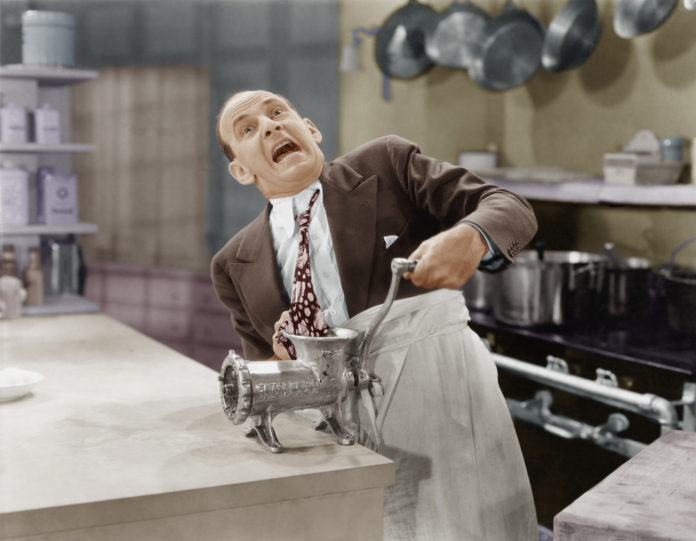Appeal of termination for cause is denied due to fraud. The government terminated a contract for meat grinders, finding that the contractor had misrepresented the existence and certification of the grinder it offered. The contractor appealed the termination to the ASBCA. The government asserted fraud as an affirmative defense. The contractor alleged it had not made misrepresentations, arguing that the solicitation had not required offerors to propose an existing, certified grinder; rather, the solicitation only required offerors to have an existing grinder at the time of delivery. The board rejected this argument, reasoning this was a commercial item acquisition, so the item had to have been extant and offered to the public. Due to the fraud, the contract was void. There was no contract in being. The board lacked jurisdiction under the CDA to hear the appeal of the termination.
The Defense Commissary Agency (DeCA) issued a solicitation seeking a mixer/grinder for meat processing as a commercial item under FAR Part 12. The solicitation stated that the grinder had to meet three requirements: (1) it had to have two motors, (2) be listed by the Underwriters Laboratory (UL), and (3) certified by the National Sanitation Foundation (NSF).
Hollymatic Corporation submitted a proposal in response to the solicitation. Hollymatic’s proposed grinder (the Model 180A) was UL listed and NSF approved but it only had one engine. As a result, DeCA found Hollymatic’s proposed grinder technically unacceptable.
But the government made some changes to the solicitation, re-opened discussion, and gave Hollymatic the chance to submit revised proposal. In its revised proposal, Hollymatic offered the same Model 180A grinder, but this grinder had two motors. The revised proposal, however, did not indicate whether the grinder was UL or NSF approved.
DeCA asked Hollymatic to clarify whether it was offering whether the Model 180A had two motors. Hollymatic stated that the Model 180A had a dual motor option. The implication was that the revised proposal just offered a dual motor option of the Model 180A grinder that already had UL and NSF approval.
DeCA awarded the contract to Hollymatic, ordering 42 grinders. But multiple commissaries reported electrical problems with the grinders. DeCA discovered that Hollymatic’s grinder had not, in fact been approved by the UL and NSF. Rather, realizing that it could only win the contract with a dual motor grinder, Hollymatic had only begun to develop the dual motor 180A during the source selection. It turned out that Hollymatic did not seek UL of NSF certification for the redesigned 180A grinder until after it had been awarded the contract.
DeCA terminated Hollymatic’s contract for cause. In addition, DeCA asserted a claim against Hollymatic for $470,000 for the grinders the government purchased. Hollymatic appealed to the ASBCA. In its answer to the appeal, DeCA asserted an affirmative defense of fraud in the inducement. Essentially, DeCA argued that Hollymatic had made a misrepresentation that induced the government to buy its grinders. The parties agreed to bifurcate the fraud issue from the appeal.
The board found that Hollymatic misrepresented its product. Hollymatic represented to the government that it was offering a dual motor option to its already approved Model 180A grinder. The implication was that this model already existed, had two motors, was UL listed, and NSF certified. None of these representations were true. The dual motor grinder did not exist; it was a new product based on a redesign of the Model 180A. Hollymatic’s final proposal did not disclose that it had developed this product to compete for the solicitation, nor that it had not been approved by NSF or UL.
Hollymatic argued there was no misrepresentation because the solicitation did not specify when the specification requirements had to be met, but only required an offeror’s promise that they could be met by the time of delivery.
The board rejected this argument, finding that nothing in the solicitation indicated that future compliance with the specifications was acceptable. Instead, the plain language of the solicitation indicated that DeCA wanted a currently existing commercial model that had been UL approved and NSF certified, not a developmental product. Indeed, this was a commercial item procurement under FAR Part 12, which defines a commercial item as one that has been offered for sale to the public. This was clearly not the case with Hollymatic’s grinder.
Hollymatic contended that it hadn’t made a misrepresentation because the documents it provided with the grinder only showed that single-motor grinder had been UL and NSF approved. The board did not find this credible. By offering what appeared to be an existing model with a dual motor option, Hollymatic created the impression that the product was already UL listed and NSF approved.
Hollymatic attempted to argue that the misrepresentation was not material. It reasoned that DeCA did not attempt to verify the UL and NSGF certification so it must not have been important. The board rejected this argument as an attempt to shift the responsibility for the accuracy of the company’s representations to the government. The government’s requirement to verify solicitation requiremenst is for the benefit of the government, not the contractor.
The board concluded that but for Hollymatic’s misrepresentations, it would not have been found technically acceptable. Thus, its actions amounted to fraud in the inducement. As a result, the contract was void ab initio. Because the contract was void, there was no CDA contract in being. The board was therefore deprived of jurisdiction to consider Hollymatic’s appeal of the termination.
Hollymatic is represented by Bruce A. Courtade of Rhoades McKee. The government is represented by Brian Lucero of the Defense Commissary Agency.




